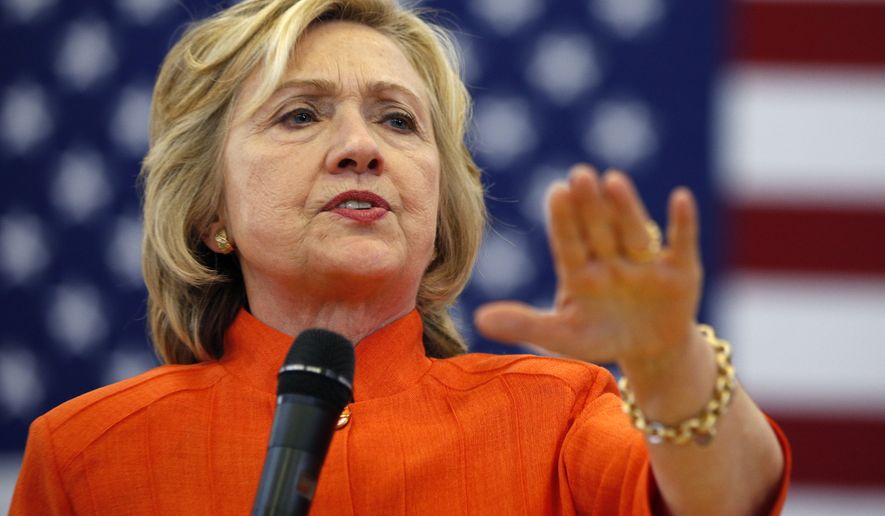Pummeled by the sheer volume of court cases demanding release of some of former Secretary Hillary Rodham Clinton’s emails, the Obama administration said late Tuesday it will ask the federal district court in Washington to combine all 16 of the requests into one case.
At least six federal judges are hearing open-records lawsuits demanding release of some or all of Mrs. Clinton’s emails, and the State Department is getting buffeted by demands from those judges, including an order from one that it work with the FBI to try to recover Mrs. Clinton’s lost emails.
“The Department of State intends to file a motion with the chief judge seeking designation of a coordinating judge for resolution and management of common issues of law, fact and procedure across numerous [Freedom of Information Act] suits,” Marsha Stelson Edney, a Justice Department lawyer, said in a status update filed with Judge Colleen Kollar-Kotelly on a case seeking any emails Mrs. Clinton and her aides sent concerning their Blackberrys, iPhones and iPads.
It’s unclear what that consolidation might mean for some of the orders already issued.
For example, Judge Raul Contreras is the one who has ensured all of Mrs. Clinton’s 30,000 emails she deemed work-related will be processed and released through January.
And Judge Emmet G. Sullivan has ordered the State Department to talk with the FBI and see whether it can recover any of the emails Mrs. Clinton said she expunged when she wiped the email server clean.
Those orders are forcing an unprecedented level of transparency onto a reluctant Obama administration, which has fought the scope and pace of the requests, and been repeatedly overruled by the judges.
But the judges are aware of how complicated matters are getting.
“I definitely understand the pressure,” Judge Tanya S. Chutkan told the State Department in a hearing last week in one of the lawsuits.
Judicial Watch, in its reply to the State Department’s new request, said it would affect 16 different cases.
The group also said the State Department has been slow-walking the current requests.
For example, the first set of documents related to Mrs. Clinton’s Blackberrys or iPads was due Aug. 20, under Judge Kollar-Kotelly’s order. But the government didn’t send it until Aug. 27.
The State Department blamed the “mailroom” for the delay, saying the “AUG 20 2015” date stamp on one of the documents proves they were prepared in time — even if they were never sent.
The sheer amount of potentially classified information in Mrs. Clinton’s emails has also proved a problem for the State Department, which missed Judge Contreras’s schedule for releasing the 30,000 emails Mrs. Clinton did return to the State Department last year.
Mrs. Clinton made the process cumbersome by waiting nearly two years after she left office to return the emails, and then only at the prodding of the congressional panel probing the 2012 Benghazi terrorist attack. When she did turn over the emails, she gave them in paper form, rather than electronic form, forcing the State Department to spend the first six months re-digitizing the documents. The department said it does not have a cost figure for that process.
Mrs. Clinton has said she didn’t break any laws in rejecting use of a state.gov email and instead using an account on a server she kept at her home in New York.
• Stephen Dinan can be reached at sdinan@washingtontimes.com.




Please read our comment policy before commenting.